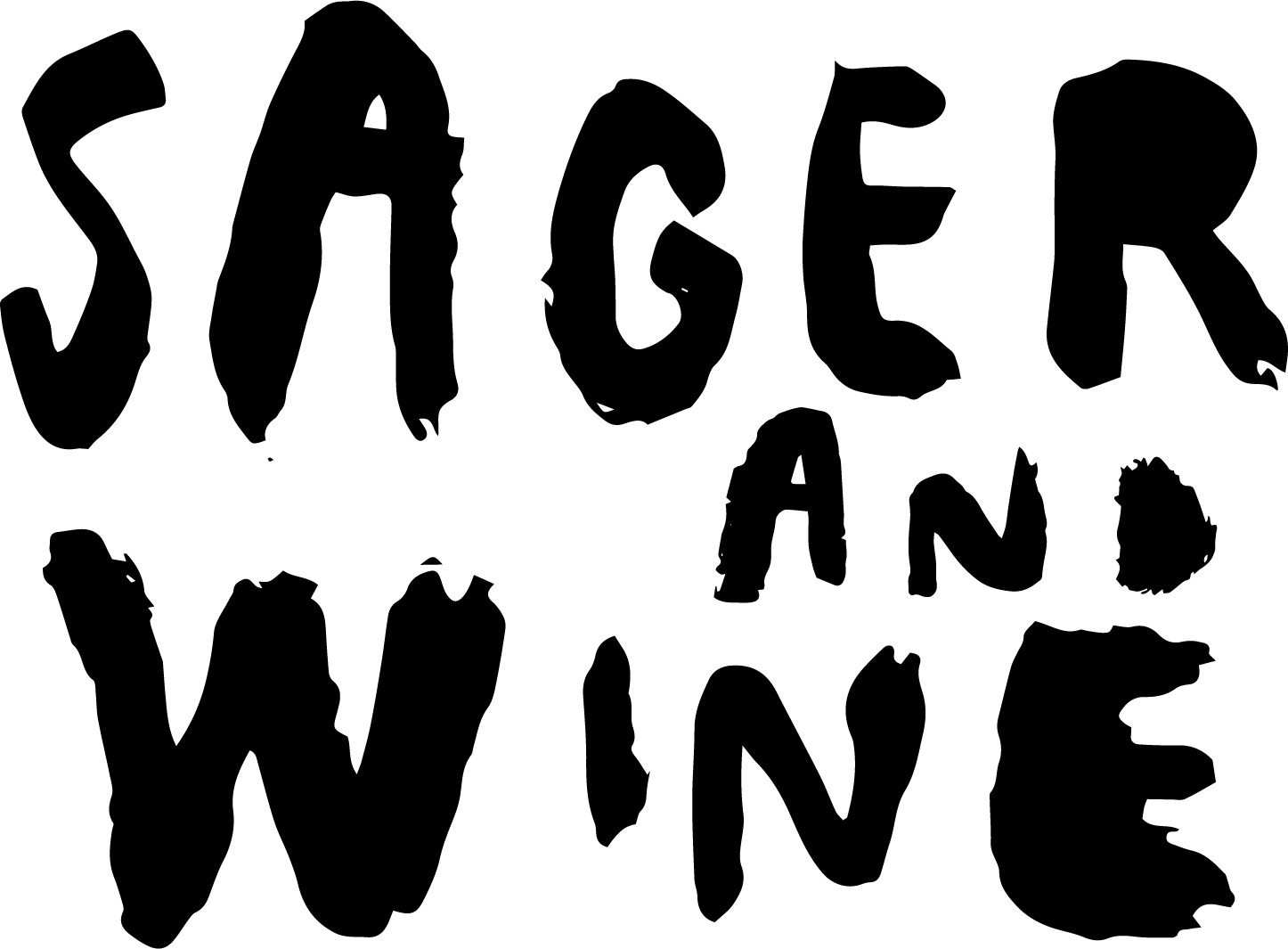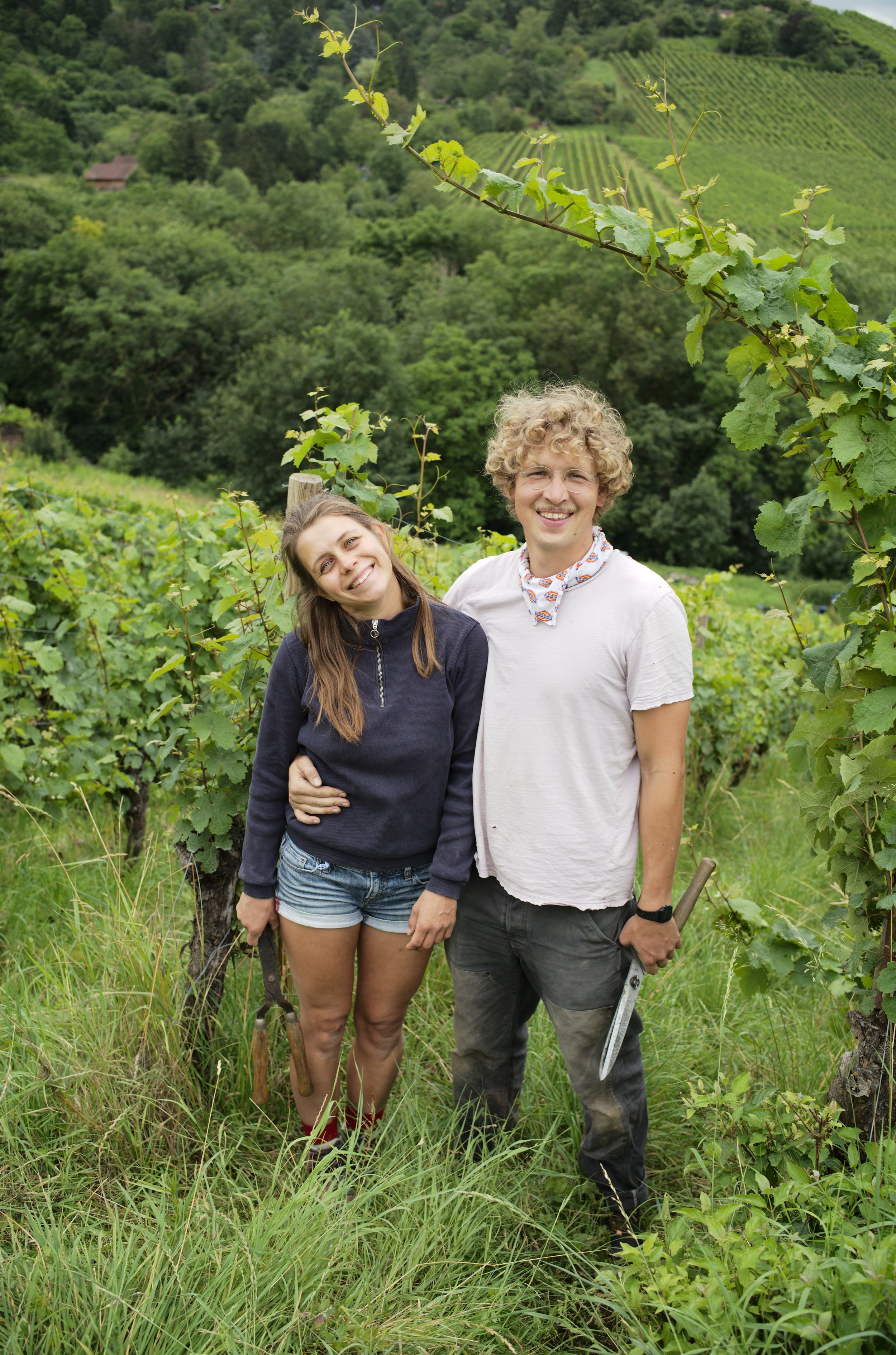KLEINES GUT
Stuttgart
Württemberg
Daniel and Frederike farm three hectares in Uhlbach, just east of Stuttgart. Their journey began in 2020, when they left the local cooperative to pursue independent winemaking, with a production of around 5,000 bottles per hectare today.
From the start, they’ve embraced a hands-off approach, committed to creating wines that are expressive and true to their terroir. They favour intuitive farming, combining patience and gentle techniques to transition their vines from previous conventional practices, restoring soil health and fostering a balanced ecosystem. Guided by the belief that biodiversity is their most powerful ally, Daniel and Frederike cultivate strong, resilient vines that coexist with wild grasses and insects, standing against the trend for “clean” vineyards.
Their winemaking process is deliberately low-tech and hands-on: grapes are hand-harvested and whole bunches are foot-crushed in vats before a gentle, slow pressing with a traditional press. Fermentations occur with indigenous yeasts and the wines age in old barrels or tanks, housed in a historic vaulted cellar dating back to 1546. Here, the wines mature over extended periods before eventually being bottled by gravity, without additives, except for the rare, minimal touch of sulfur when needed (10–20 mg/L).
Finally, the packaging also reflects the winery’s eco-conscious ethos, using lightweight bottles, FSC-certified paper and bio-based materials for labels and closures to reduce environmental impact. In every aspect, Daniel and Frederike’s process captures the essence of their vineyard with purity, patience, and respect for the natural world.
Vin de Soif Blanc
Vintage 2024
Style White
Region Stuttgart, Württemberg
Varieties Riesling, Kerner, Johanniter
ABV 12%
Soils Sandstone, marl
Farming Organic, biodynamic principles
Winemaking A similar blend to last years’, thoguh with fewer varieties in 2024. This year, there was also less skin contact (only up to two days, compared to last year's five days). All fermented in stainless steel after pressing and left to mature on lees for 6 months.
Tasting Note Aromatic peach, chamomile, meadow flowers and white pepper. Palate is juicy and textural.
Vom Mergelgestein
Vintage 2023
Style White
Region Stuttgart, Württemberg
Varieties Riesling
ABV 12%
Soils Sandstone, red marl
Farming Organic, biodynamic principles
Winemaking A mix of mainly old vines (50 years old) combined with a younger vineyard (approx 15 years old). Fruit is sourced from five plots with southeast exposure, all planted on marl soil (hence the name of the cuvée). The soil features a 1–3 meter deep clay marl layer, forcing the vines to root into the barren reed sandstone below. A few hours of maceration in open vats, followed by spontaneous fermentation in used barriques and a tonneau. The wine is then aged for 9 months in used barrels and after in tank. Bottled by gravity and without any filtration.
Tasting Note The terroir here shows a balance of juiciness (from the clay) and minerality (from the sandstone), giving the wine a character of tension, clarity, and verticality. Warm citrus, beeswax, flinty tones and white flowers. Great energy and depth.
Vin de Soif Rouge
Vintage 2024
Style Red
Region Stuttgart, Württemberg
Varieties Trollinger, Lemberger, Dornfelder
ABV 11%
Soils Sandstone, marl
Farming Organic, biodynamic principles
Winemaking The 2024 red version of Vin de Soif is made up of a blend of mostly Trollinger - a light-skinned variety also known as Schiava, or Vernatsch - with smaller proportions of Lemberger (40%) and Dornfelder (10%). The grapes are de-stemmed and undergo a brief maceration of just five days in open-top vats. After pressing, the wine feeds into stainless steel tanks where the sugars are finished and the wine is kept for about 6 months. Bottled unfiltered, with a small amount of sulphur (<20mg/l).
Tasting Note Red currants, spiced red cherry, pink peppery and violet notes. Light and crunchy, lovely chilled.
Vom Mergelgestein
Vintage 2023
Style Red
Region Stuttgart, Württemberg
Varieties Spätburgunder
ABV 11.5%
Soils Sandstone, red marl, keuper
Farming Organic, biodynamic principles
Winemaking The grapes come from the domaine’s four Pinot Noir small vineyards. Vines here are a mix of German Pinot Noir clones and a vineyard with French selection from Burgundy. Plants span between 20 and 50 years old and are planted on the same terrains as seen in the Riesling. Bunches are harvested whole and fermented using the technique of semi-carbonic maceration for 10 days. Once pressed, the wine feeds into used barrels, where it consumes the last sugars and ages for a period of 12 months.
Tasting Note Elegant and perfumed with notes of rooibos tea, rose and plum.
Götzen, Grand Cru
Vintage 2022
Style White
Region Stuttgart, Württemberg
Varieties Riesling
ABV 12.5%
Soils Sandstone, red marl
Farming Organic, biodynamic principles
Winemaking An old vineyard that consistently produces the domaine’s finest grapes every year. Harvested late in autumn with high ripeness, then gently and very slowly pressed before resting for 24 months on its full lees in barrels. Bottled and aged an additional six months in bottle.
Tasting Note This wine is all about quiet, gentle, yet persistent long notes and lines, salinity, and minerality. A wine that is meant to mature with time.






